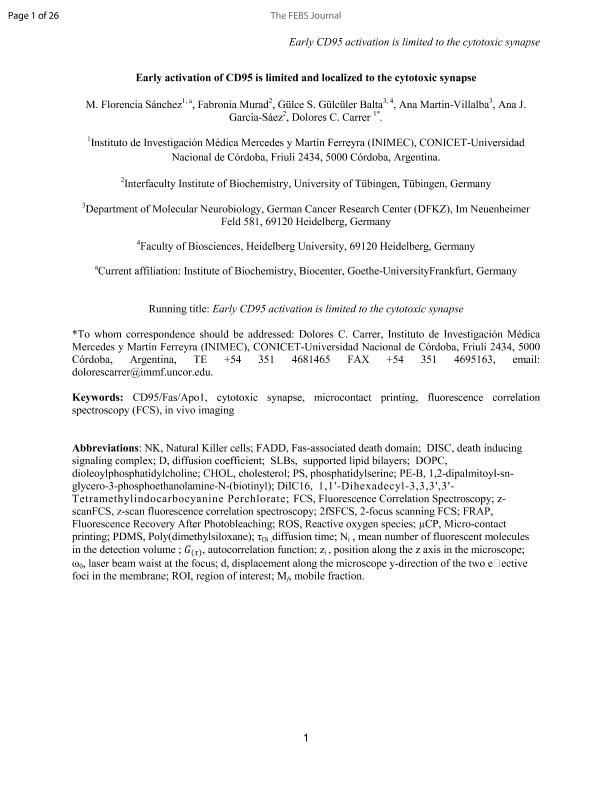Mostrar el registro sencillo del ítem
dc.contributor.author
Sánchez, María Florencia

dc.contributor.author
Murad, Fabronia
dc.contributor.author
Gülcüler Balta, Gülce S.
dc.contributor.author
Martin Villalba, Ana
dc.contributor.author
García Sáez, Ana J.
dc.contributor.author
Carrer, Dolores Catalina

dc.date.available
2020-01-23T21:25:58Z
dc.date.issued
2018-08
dc.identifier.citation
Sánchez, María Florencia; Murad, Fabronia; Gülcüler Balta, Gülce S.; Martin Villalba, Ana; García Sáez, Ana J.; et al.; Early activation of CD95 is limited and localized to the cytotoxic synapse; Wiley Blackwell Publishing, Inc; Febs Journal; 285; 15; 8-2018; 2813-2827
dc.identifier.issn
1742-464X
dc.identifier.uri
http://hdl.handle.net/11336/95731
dc.description.abstract
The cytotoxic synapse formed between cytotoxic T lymphocytes or natural killer cells expressing CD95L and target cells with CD95 on their surface is a key pathway for apoptosis induction by the immune system. Despite similarities with the immune synapse in antigen presenting cells, little is known about the role of the spatiotemporal organization of agonistic proteins/receptor interactions for CD95 signaling. Here, we have developed an artificial cytotoxic synapse to examine how mobility and geometry of an anti-CD95 agonistic antibody affect receptor aggregation and mobility, ie the first step of receptor activation. By measuring the distribution, diffusion coefficient, and fraction of immobile CD95 receptor in living cells, we show that at short times, the initial activation of CD95 occurs locally and is limited to the contact region of the cytotoxic synapse. This anisotropic activation of apoptotic signaling supports a role for confined interactions on the efficiency of signal transduction that may have implications for biomedical applications of extrinsic apoptosis induction.
dc.format
application/pdf
dc.language.iso
eng
dc.publisher
Wiley Blackwell Publishing, Inc

dc.rights
info:eu-repo/semantics/openAccess
dc.rights.uri
https://creativecommons.org/licenses/by-nc-sa/2.5/ar/
dc.subject
CD95/FAS/APO1
dc.subject
CYTOTOXIC SYNAPSE
dc.subject
FLUORESCENCE CORRELATION SPECTROSCOPY
dc.subject
IN VIVO IMAGING
dc.subject
MICROCONTACT PRINTING
dc.subject.classification
Biofísica

dc.subject.classification
Ciencias Biológicas

dc.subject.classification
CIENCIAS NATURALES Y EXACTAS

dc.title
Early activation of CD95 is limited and localized to the cytotoxic synapse
dc.type
info:eu-repo/semantics/article
dc.type
info:ar-repo/semantics/artículo
dc.type
info:eu-repo/semantics/publishedVersion
dc.date.updated
2019-10-23T14:25:58Z
dc.journal.volume
285
dc.journal.number
15
dc.journal.pagination
2813-2827
dc.journal.pais
Reino Unido

dc.journal.ciudad
Londres
dc.description.fil
Fil: Sánchez, María Florencia. Consejo Nacional de Investigaciones Científicas y Técnicas. Centro Científico Tecnológico Conicet - Córdoba. Instituto de Investigación Médica Mercedes y Martín Ferreyra. Universidad Nacional de Córdoba. Instituto de Investigación Médica Mercedes y Martín Ferreyra; Argentina
dc.description.fil
Fil: Murad, Fabronia. Universität Tübingen; Alemania
dc.description.fil
Fil: Gülcüler Balta, Gülce S.. German Cancer Research Center; Alemania. Heidelberg University; Alemania
dc.description.fil
Fil: Martin Villalba, Ana. German Cancer Research Center; Alemania
dc.description.fil
Fil: García Sáez, Ana J.. Universität Tübingen; Alemania
dc.description.fil
Fil: Carrer, Dolores Catalina. Consejo Nacional de Investigaciones Científicas y Técnicas. Centro Científico Tecnológico Conicet - Córdoba. Instituto de Investigación Médica Mercedes y Martín Ferreyra. Universidad Nacional de Córdoba. Instituto de Investigación Médica Mercedes y Martín Ferreyra; Argentina
dc.journal.title
Febs Journal

dc.relation.alternativeid
info:eu-repo/semantics/altIdentifier/url/http://doi.wiley.com/10.1111/febs.14518
dc.relation.alternativeid
info:eu-repo/semantics/altIdentifier/doi/http://dx.doi.org/10.1111/febs.14518
Archivos asociados
